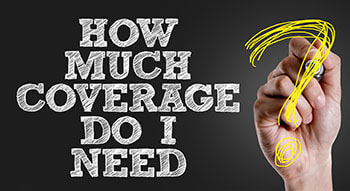Answers to Five Frequently Asked Questions Consumers Have About Life Insurance

All too often, we review life insurance in hindsight.
It’s something our neighbor down the street, the woman in the accounting department at work, or our cousin’s wife’s son across the country could have had – no, make that should have had – to soften the financial blow from a health condition or sudden crisis they faced.
While insurance has proven its value repeatedly, many continue to live without it. According to a recent study, 37 percent of Americans do not have life insurance. One reason is they think it is too expensive.
Yet even those willing to consider insurance have trouble deciding on the right time to get it. Young adults, for instance, often question the need to obtain a policy while they are single and healthy. Later, they may hesitate to buy coverage after they wed, and once again when starting a family.
AmeriLife is in the peace of mind business
Our company markets and distributes insurance and retirement solutions. However, our mission is to help people live longer and healthier lives.
With this goal in mind, we would like to address a few common questions about life insurance.
What kinds of life insurance are there?
Let’s look at three broad categories: whole life, universal life, and term life.
Whole life provides the buyer with a steady premium payment cost and accumulates cash value. Universal life offers flexible premium payments, death benefits and incorporates a savings feature. Both are considered “permanent”.
The third category is term life insurance. This type of policy pays out only if the policyholder dies during the period of coverage, which is why we refer to it as “temporary”.
Insurance is protection
How much life insurance do I need?
That depends. The purpose of insurance is to serve as a financial safety net. Do you want it for some, or all, of the following reasons?
- Offset costs related to a serious injury, chronic illness or disease affecting you or a loved one
- Provide a surviving spouse or domestic partner with money to pay bills, buy food and gas, etc.
- Ensure your children or grandchildren can afford to go to college when the time comes
- Cover your burial or cremation expenses
- Pay off any debt you may leave behind, such as a mortgage payment or a credit card balance
Why should I get any insurance in my 20s?
Even if you are just entering the workforce and are unmarried, there are good reasons to consider life insurance.
Should you die unexpectedly, whoever will be managing your affairs can use it to pay off any outstanding debt you may have. Final Expense insurance in particular can cover your cremation or burial. It can additionally provide funds allowing you to travel to a memorial service, or help with the transportation costs of others coming to your location from out of town.
Whom can I designate as a life insurance beneficiary?
Just about anyone. However, beneficiaries under the age of 18 must appoint a trustee to oversee the proceeds until they reach the age of majority in their state. You may also leave funds to nonprofits, community organizations, and educational institutions.
Where do I begin to find life insurance?
If you prefer to take a do-it-yourself approach, you can learn more about and buy life insurance online through a direct-to-consumer website. Another option is to work with an agent.
AmeriLife agents have access to the products of our numerous carrier partners. It allows them to present consumers with many more plan choices than agents limited to selling what the company employing them offers.
Learn more about the value of an independent insurance agent.
Weighing the options
In closing, we looked at common questions about life insurance and explored how coverage can help manage costs created by unexpected occurrences. It can also support those who depend on us if we are no longer able to.
For many people, this is an uncomfortable subject. We simply do not want to think about, much less plan for, anything bad befalling the people closest to us, or us personally.
Nevertheless, we urge you to do some research today. Compare the monthly cost of a premium payment for insurance benefits against the huge financial impact a serious injury, illness or death can have on your lives.
Now ask yourself, what should I do?
Clicking third-party links will open a new tab and will take you away from AmeriLife.com. AmeriLife does not control the linked sites’ content or link.
